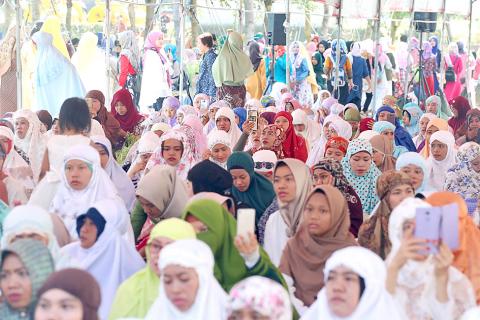More than 500 Muslims yesterday gathered at Taipei Railway Station to celebrate Eid al-Fitr, which marks the end of the Muslim holy month of Ramadan, the ninth month on the Islamic calendar.
The group mainly comprised of Indonesian migrant workers who shared dishes and exchanged blessings at the gathering, which was organized by the Taipei Foreign and Disabled Labor Office.
The office distributed gifts, such as environmentally friendly utensils and fans, to attendees who uploaded their photographs to Facebook and handed out picnic blankets to those who took part in a Chinese word game.

Photo: CNA
Department Commissioner Lai Hsiang-lin (賴香伶) handed out traditional fragrance sachets to the attendees and extended the Taipei City Government’s well wishes.
“The city government would like Taiwanese to treat migrant workers who are working and living here just as they would treat a fellow compatriot,” Lai said.
Surwanti, an Indonesian caregiver who has been in Taiwan for 14 years, said she was happy to attend the event, adding that her employers treat her well and support her attending Muslim religious events.
As a Muslim, she was touched that Taiwan organized such an event to make her feel at home, she added.
Amalina, an Indonesian domestic helper who has been in Taiwan for four years, said that even though she was far from her family, she was happy to take part in the event, because she was able to spend Eid al-Fitr with her friends.
Taipei Deputy Mayor Tsai Ping-kun (蔡炳坤) said the celebration was important for Indonesian migrant workers and other Muslims in Taiwan, as they had shown their faith by fasting during the month of Ramadan.
“I think that fasting is not only a religious rite, but also a symbol of human rights, as there are many places in the world that are going through rough times, and fasting shows our devotion” to helping others, Tsai said.
The event also gave Taiwanese an opportunity to understand the cultures of migrants to promote friendship, said Tsai, who estimated that there are about 40,000 Indonesian migrant workers in the city.
Eid al-Fitr begins with the first sighting of the new moon, so it varies from country to country depending on geographical location.
In Taiwan, Tuesday was the 30th and last day of Ramadan, during which Muslims abstain from eating and drinking from dawn to dusk, the Taiwan Imams Committee said.
There were 270,890 Indonesian migrant workers in Taiwan as of the end of April, Ministry of Labor statistics showed.
Indonesia is the largest Muslim-majority nation in the world.

RESOLUTIONS DEBATE: Taiwan’s allies said that UN and WHA resolutions cited by China and other nations ‘do not determine Taiwan’s participation in WHO activities’ A proposal to invite Taiwan to this year’s World Health Assembly (WHA) was rejected on Monday, resulting in Taipei’s absence from the annual meeting for a ninth consecutive year, although partners spoke up for Taiwan’s participation at the first day of the meeting. The first agenda item after the opening was a “two-on-two debate” on a proposal to invite Taiwan to participate at the WHA as an observer. Similar to previous years, two countries made statements in favor of the proposal, while two others expressed their opposition. Philippine Secretary of Health Teodoro Herbosa, president of the 78th WHA, accepted the WHA General Committee’s

Palauan President Surangel Whipps Jr arrived in Taiwan last night to kick off his first visit to the country since beginning his second term earlier this year. After arriving at Taoyuan International Airport at around 6:30 pm, Whipps and his delegation were welcomed by Minister of Foreign Affairs Lin Chia-lung (林佳龍). Speaking to gathered media, the Palauan leader said he was excited and honored to be back in Taiwan on his first state visit to Taiwan since he was sworn in this January. Among those traveling with Whipps is Minister of State Gustav N. Aitaro, Public Infrastructure

Premier Cho Jung-tai (卓榮泰) on Friday laid out the Cabinet’s updated policy agenda and recapped the government’s achievements ahead of the one-year anniversary of President William Lai’s (賴清德) inauguration. Cho said the government had made progress across a range of areas, including rebuilding Hualien, cracking down on fraud, improving pedestrian safety and promoting economic growth. “I hope the public will not have the impression that the Cabinet only asked the legislature to reconsider a bunch of legal amendments,” Cho said, calling the moves “necessary” to protect constitutional governance and the public’s interest. The Cabinet would work toward achieving its “1+7” plan, he said. The

Nvidia founder and CEO Jensen Huang (黃仁勳) hosted a dinner in Taipei last night with key Taiwanese suppliers to celebrate the successful mass production of the company’s new Blackwell AI systems. Speaking to the media earlier yesterday, Huang thanked Nvidia’s Taiwanese partners for their contributions to the company’s ecosystem, while also sharing his plans to meet with Taiwan Semiconductor Manufacturing Co (TSMC) founder Morris Chang (張忠謀). In response to rumors that Nvidia will launch a downgraded Hopper H20 chip for China in July, Huang dismissed the reports, saying, “That is not true.” He clarified that there